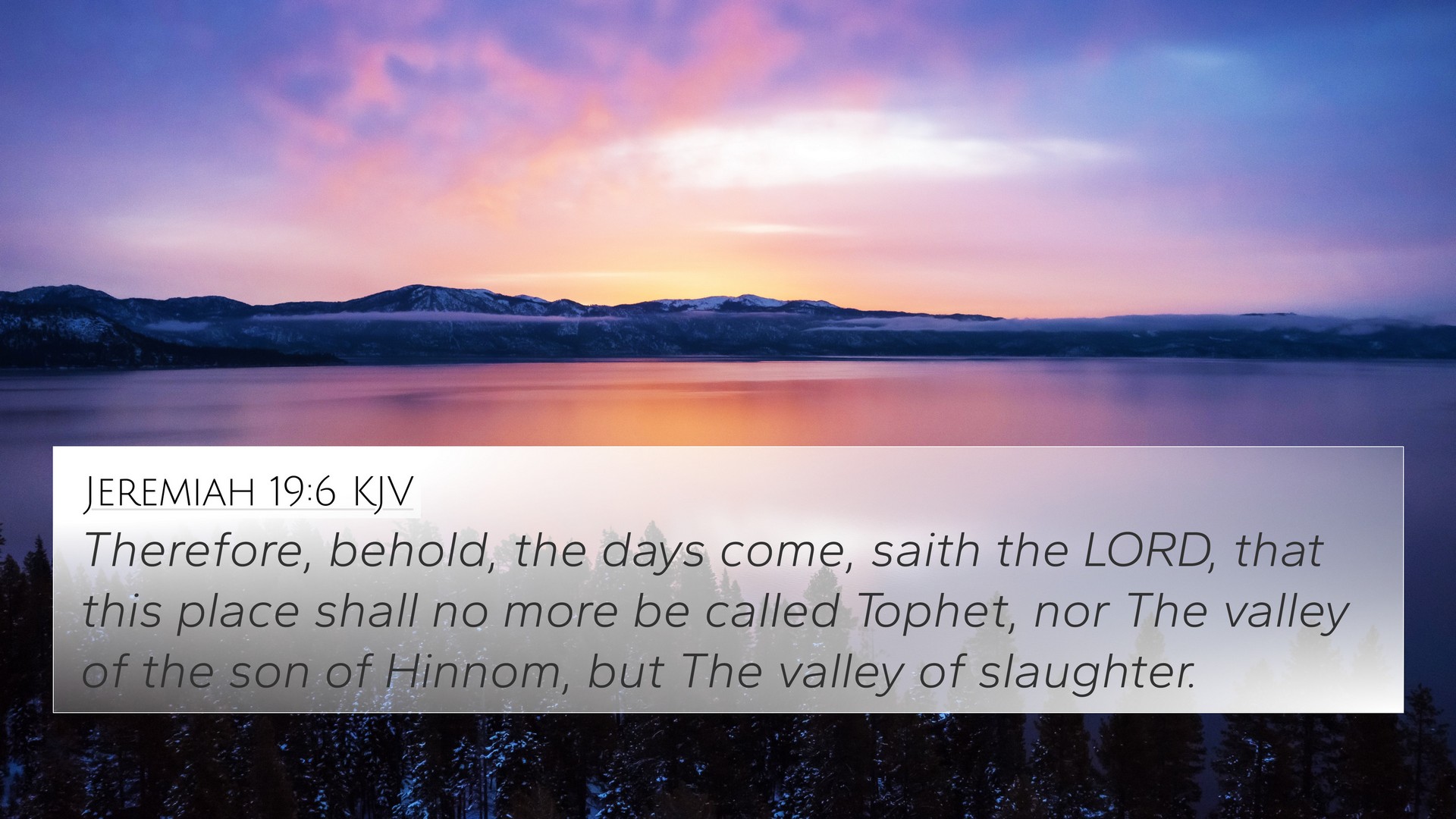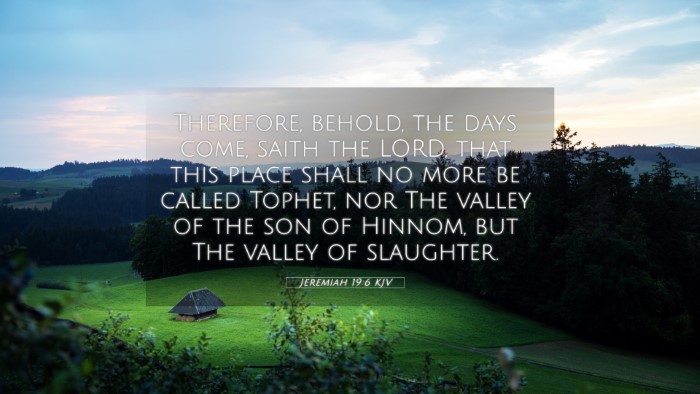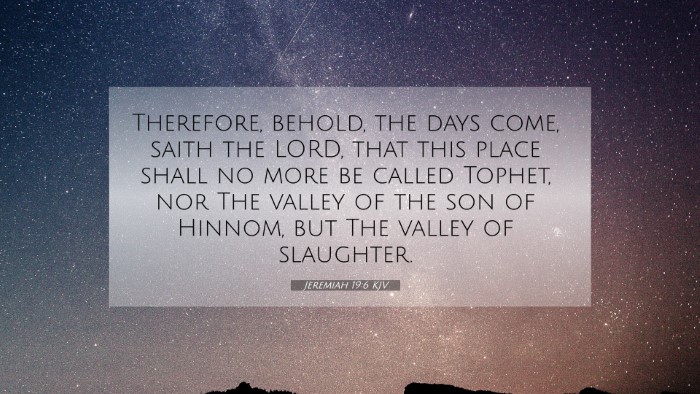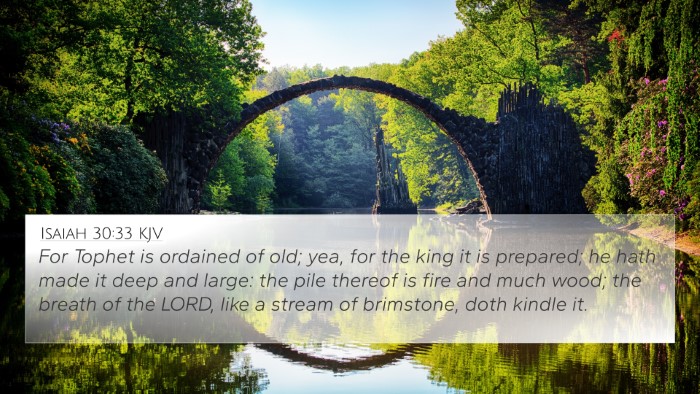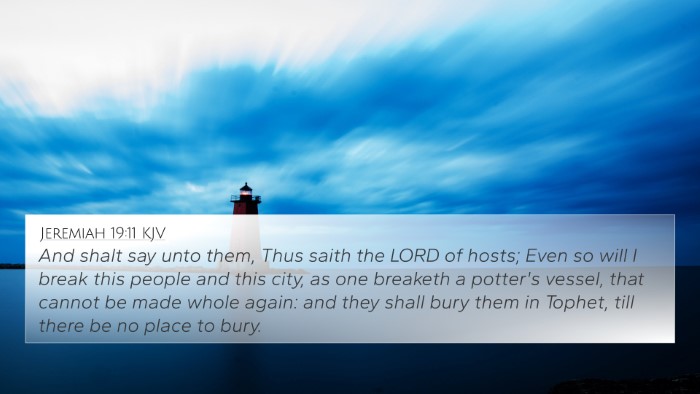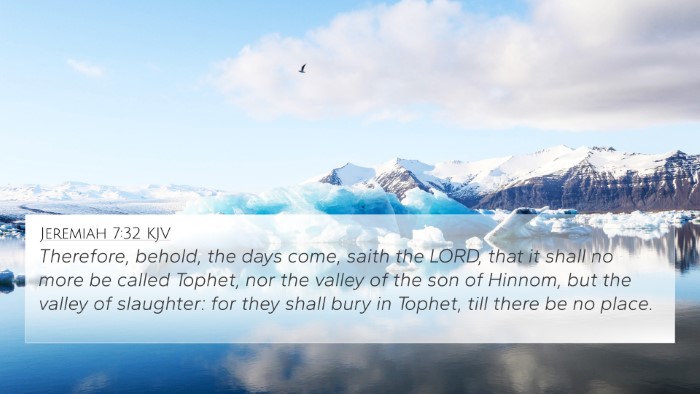Understanding Jeremiah 19:6
Verse: “Therefore, behold, the days come, saith the Lord, that this place shall no more be called Tophet, nor The valley of the son of Hinnom, but The valley of slaughter.”
Summary of Jeremiah 19:6
This verse from Jeremiah 19:6 serves as a solemn declaration of God's impending judgment against Judah. Through the prophet Jeremiah, God announces a transformation in the meaning of Tophet and the valley of Hinnom, places associated with idolatry and child sacrifice. Instead of a site of worship, it would become a valley of slaughter, depicting the destruction that awaits those who have turned away from Him. This profound shift illustrates the severity of God’s judgment and the consequences of unfaithfulness.
Commentary Insights
The verse draws substantial insights from several public domain commentaries:
- Matthew Henry: He emphasizes the significance of the valley of Hinnom, historically linked with idolatry, suggesting that its notoriety will shift from a site of false worship to a graveyard reflecting divine judgment. Henry parallels the concept of divine retribution with the earlier prophetic messages against Jerusalem.
- Albert Barnes: Barnes focuses on the concept of naming and renaming in biblical texts. He notes that the renaming from Tophet to the valley of slaughter signifies a transformation in the identity of the place, ensuring it serves as a reminder of God’s justice and the dire consequences of sin.
- Adam Clarke: Clarke discusses the prophetic nature of Jeremiah's message, suggesting that it serves as both a warning and an eventual fulfillment of God’s promises to cleanse His people from idolatrous practices. He highlights the historical context of the valley and its purpose within the larger narrative of redemption.
Bible Cross-References
Jeremiah 19:6 connects deeply with multiple other scriptural passages. Here are some significant cross-references that help illustrate the themes found in this verse:
- 2 Kings 23:10: This verse references the defilement of Tophet due to child sacrifices, establishing the valley’s dark history.
- Jeremiah 7:31: This verse further elaborates on the heinous practices conducted in Tophet, reinforcing the call to repentance.
- Isaiah 66:24: Like Jeremiah, Isaiah speaks of judgment and the consequences of sin, using similar imagery.
- Matthew 5:22: In the New Testament, Jesus refers to the danger of judgment, echoing the themes of consequences present in Jeremiah’s message.
- Revelation 14:10: This passage speaks of divine wrath and eternal judgment, linking back to Old Testament warnings.
- Ezekiel 39:4: Ezekiel uses similar language of slaughter and judgment on nations, indicating the continuity in God’s prophetic messages.
- Lamentations 3:38: Reminds readers that God both brings calamity and peace, aligning with themes of judgment found in Jeremiah.
- Romans 6:23: Discusses the wages of sin, echoing the dire consequences of the idolatry seen in the days of Jeremiah.
- Joel 3:2: This verse reinforces the themes of judgment upon nations for their sins, reminiscent of Jeremiah's pronouncements.
- Hebrews 10:31: Connects the idea of falling into the hands of a living God, highlighting the seriousness of sin and its repercussions.
Thematic Connections
The themes explored in Jeremiah 19:6 highlight significant theological concepts relevant throughout Scripture.
- Divine Judgment: The urgency of God's call for judgment reflects His holiness and the seriousness with which He views sin.
- Idolatry and Consequences: The transformation of Tophet serves as a stark warning against the hazards of turning away from God.
- Redemption and Hope: Despite the grim message, there is an overarching narrative of hope in eventual restoration found throughout the prophetic writings.
Tools for Bible Cross-Referencing
For those looking to explore the connections between Bible verses like Jeremiah 19:6, several tools and methods can enhance understanding:
- Bible Concordance: A helpful resource for locating words and themes across different biblical passages.
- Bible Cross-Reference Guide: Provides organized connections between verses, facilitating deeper study.
- Bible Reference Resources: Various guides can aid in identifying thematic links and cross-references among scriptures.
- Bible Chain References: Chains allow readers to follow related verses easily, enhancing scriptural connections.
- Cross-Referencing Bible Study Methods: Systematic approaches to studying interconnected verses can yield richer insights.
- Comprehensive Bible Cross-Reference Materials: These offerings often contain exhaustive lists of cross-referenced scriptures and commentary insights.
Application and Reflection
In approaching Jeremiah 19:6, consider how the themes of judgment, redemption, and idolatry apply to contemporary faith. Reflect on the overall message of warning while also recognizing the ultimate hope provided through restoration in Christ. Engaging with the rich tapestry of Scripture enhances understanding and internalization of God's truth.
Conclusion
Jeremiah 19:6 serves as a poignant reminder of God's justice and the grave consequences of turning away from Him. By examining this verse in connection with others in both the Old and New Testaments, one can grasp a more profound understanding of divine themes throughout Scripture. Through tools for cross-referencing and careful study, believers can strengthen their faith and deepen their relationship with God.
